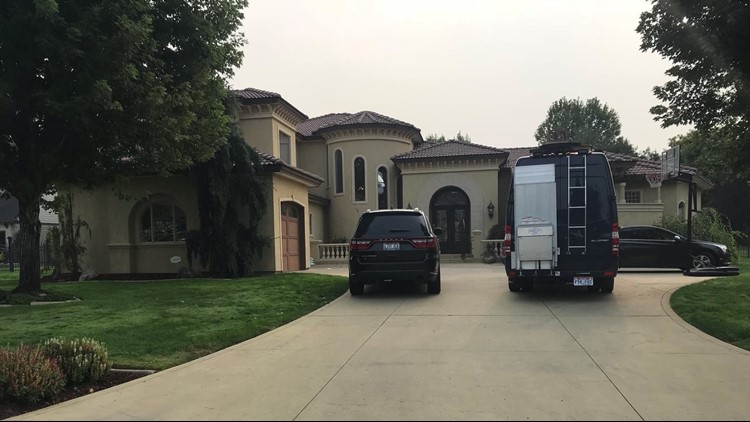BOISE, Idaho — A family of eight Treasure Valley residents and a colleague accused of operating a multimillion-dollar cellphone smuggling ring out of Boise for more than a decade appeared in court Thursday for a status hearing to discuss trial preparations.
The court appearances were the latest development in a case that saw its first charges more than 2 1/2 years ago.
Pavel, Gennady, Piotr and Timofey Babichenko, all brothers, alongside sister Anna Iyerusalimets, her husband, Mikhail, and colleague David Bibikov, appeared via Zoom before U.S. District Judge B. Lynn Winmill alongside Kristina and Natalya Babichenko, who married into the family, according to court records.
The counterfeit products that were trafficked included primarily “Apple iPhones and Samsung cellular products” which were allegedly repackaged at two family-owned warehouses in Boise, then resold as genuine through platforms such as Amazon and Ebay. The defendants also operated a variety of businesses through which they're accused of selling the goods, according to court documents and the U.S. Attorney’s Office for the District of Idaho.
Attorneys for the defendants and government prosecutors discussed an ongoing discovery process involving a significant amount of evidence possessed by both sides, which according to records, the court has worked to narrow down in order to ensure a speedy trial.
Winmill explained the effect COVID-19 is having on proceedings, stating the court's epidemiologist indicated that even with the vaccine rollout, the "CDC and other health officials will be requiring that we mask and maintain social distancing probably well into the fall.”
The uncertainty of the proceedings' schedule is due to the new variants of COVID-19 paired with the likelihood that some people will refuse the vaccine, Winmill said. He opted to press forward with the current trial date, set for June, with a specially planned courtroom layout.
He added that it’s likely not all jurors or witnesses will have been vaccinated. “I don’t think I have any ability or right to require someone to take a vaccine,” he said.
Attorneys for defendants challenged the decision to move forward with the current trial date of June 8, pushing for a September date instead, which Winmill declined, citing the defendants' constitutional rights and the public's right to a speedy trial.
A separate Wi-Fi network will be set up in June to allow participants from all over the world to attend the trial as necessary due to known problems with the public Wi-Fi offered at the federal courthouse in Boise.
A 10th defendant in the case, Artur Pupko, pleaded guilty to two counts of trafficking in counterfeit goods and one count of conspiracy to launder money in a deal with government prosecutors in September 2019. The government agreed to drop the remaining 14 counts against Pupko, though records show he has not yet been sentenced and was appointed a new attorney.
Two defendants, Pavel and Gennady Babichenko, were released from custody in late July and early August 2019 following Winmill’s initial decision to deny each man’s motion for release, citing what court records describe as a substantial flight risk. Each man was required to surrender his passport.
The 10 defendants were indicted on 34 counts in August 2018. Each of the accused faces different charges including conspiracy to commit wire fraud, mail fraud, conspiracy to traffic in counterfeit trademarked goods and money laundering conspiracy, and each defendant faces between seven and 18 charges.
U.S. Attorney Bart M. Davis said at an August 2018 press conference that the organization controlled approximately $10 million worth of property at the time of the arrests. The conspiracy likely affected more than 25,000 victims, Davis said.
The case included FBI and Homeland Security raids on an array of Treasure Valley homes and businesses, according to previous Idaho Press reports.
The indictment alleged that the products, which included cellphones and cellphone accessories, were purchased in bulk from manufacturers based in Hong Kong before being repackaged locally and sold as both genuine and new, causing defendants to launder millions of dollars in proceeds.
Records state that over the course of the investigation, FBI and Homeland Security Investigations agents identified “over fifty U.S. Customs and Border Protection seizures of counterfeit electronic goods associated with this conspiracy” and that defendants operated more than 100 separate business entities to sell the products to customers.
Pavel, Piotr and Timofey Babichenko “traveled from Boise to China and Hong Kong directly to obtain their supply,” prosecutors alleged during a 2018 detention hearing.
The three also traveled to Brazil with brother Gennady Babichenko “where they are building eponymous condominiums with the proceeds of their counterfeit goods trafficking,” stated prosecutors, claiming that Gennady Babichenko operated an “expansive” money laundering scheme, funneling proceeds to accounts in Brazil and elsewhere.
If convicted, each defendant faces up to 10 years imprisonment and a $5 million fine on the counterfeit trademark goods trafficking counts, according to the U.S. Attorney’s Office for the District of Idaho, which specified that all additional counts listed in the indictment carry up to 20 years imprisonment and a $250,000 fine.
This story originally appeared on The Idaho Press website.
More from our partners at The Idaho Press: 1st person pleads guilty in Treasure Valley counterfeit cellphone case
Watch more crime news:
See the latest Treasure Valley crime news in our YouTube playlist:



